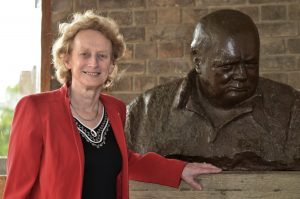Podcast: Play in new window | Download
MULTITASKING IS A FALLACY SAYS ALEXANDRA OLAYA-CASTRO
Alexandra Olaya-Castro is a Colombian-born theoretical physicist, mother of two, and professor in the Department of Physics and Astronomy at University College London. She is also the Vice-Dean over Equality, Diversity and Inclusion of the Mathematical and Physical Science Faculty.
As a successful scientist-mother in the male-dominated field of physics, she is frequently asked how she is able to balance her work as a mother while making progress as a scientist. She responds with four pieces of advice. The first is to build a strong support network, whether that network is composed of a group of people or just one good person. “Having a strong support network gives you the tranquility to be able to tackle work issues without having to worry about many of those family issues.”
The second piece of advice is to be aware that “sometimes you will need to accept that you will have to put a lot of your focus on your work and sometimes you will need to accept that you will need to put your whole focus on your family. You will need to decide which frequency is the best for you.” Like most science mamas, Alexandra has struggled with mother guilt. However, she also realized early on that it was a horrible cycle that she needed to break. She did this by learning to trust herself. From experience, she knows that she won’t forget what is most important.
The third piece of advice is that multitasking is a fallacy. “You can try to do it, but it is unsustainable. You will feel overworked. You will feel overloaded. You will feel too tired. And in the end you will feel that you will feel like you are inadequate on all fronts.” Alexandra knows that science mamas have a limited amount of time so prioritizing one’s focus is the only way to make progress. Before she was a mother, she would work at all hours and attend as many seminars as she could even if they weren’t in her field. Once she became a mother, she got choosier about how she spends her time at work. If publishing a paper or attending a conference will further her progress more than another activity, she will make sure that is her priority. “The only way to make it is to optimize the time to do the things that are the most important and accept that you won’t be able to do it all. You have to learn that some things have to give and you need to identify which things are the most important and put your energy on those.”
Her fourth piece of advice is to take the time to exercise even when it is difficult to fit in. She says, “without it my mind wouldn’t work.”
